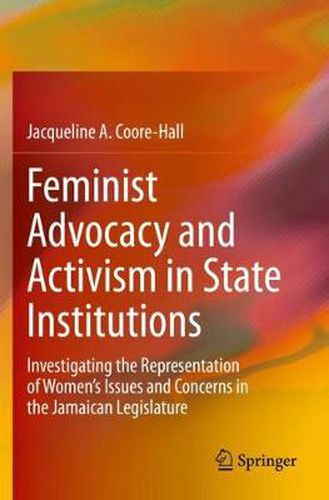Readings Newsletter
Become a Readings Member to make your shopping experience even easier.
Sign in or sign up for free!
You’re not far away from qualifying for FREE standard shipping within Australia
You’ve qualified for FREE standard shipping within Australia
The cart is loading…






This title is printed to order. This book may have been self-published. If so, we cannot guarantee the quality of the content. In the main most books will have gone through the editing process however some may not. We therefore suggest that you be aware of this before ordering this book. If in doubt check either the author or publisher’s details as we are unable to accept any returns unless they are faulty. Please contact us if you have any questions.
This book analyzes the effect of gender on policy-making in the Jamaican Parliament, specifically regarding women-friendly policies. So-called women-friendly policies are categorized as those laws which seek to promote and protect women’s rights and equality and have some element addressing childcare, domestic violence, sex offences, reproductive rights, sex discrimination, property rights and family issues. It frames critical analysis of bill sponsorship and the participation levels and verbal contributions of legislators during floor debates on legislation affecting women. Using a mixed method approach, the author gives insight into how feminism is integrated into real-time public policy discourse. The book begins with a brief overview of feminist advocacy and activism and State feminism in Jamaica and an introduction to the country’s Parliamentary system. It then moves to a theoretical discussion of feminist advocacy within public policy debates. The next two chapters present a time series analysis of bill introduction and floor debates on women’s interests and issues legislation from 1962 through 2017. The concluding chapter ties up the research and provides recommendations for moving forward. Combining feminist theory with a detailed view of Jamaican Parliamentary procedure and debate, this book will be useful to students and researchers interested in feminist advocacy and activism, minority representation, democratic governance, and women in politics.
$9.00 standard shipping within Australia
FREE standard shipping within Australia for orders over $100.00
Express & International shipping calculated at checkout
This title is printed to order. This book may have been self-published. If so, we cannot guarantee the quality of the content. In the main most books will have gone through the editing process however some may not. We therefore suggest that you be aware of this before ordering this book. If in doubt check either the author or publisher’s details as we are unable to accept any returns unless they are faulty. Please contact us if you have any questions.
This book analyzes the effect of gender on policy-making in the Jamaican Parliament, specifically regarding women-friendly policies. So-called women-friendly policies are categorized as those laws which seek to promote and protect women’s rights and equality and have some element addressing childcare, domestic violence, sex offences, reproductive rights, sex discrimination, property rights and family issues. It frames critical analysis of bill sponsorship and the participation levels and verbal contributions of legislators during floor debates on legislation affecting women. Using a mixed method approach, the author gives insight into how feminism is integrated into real-time public policy discourse. The book begins with a brief overview of feminist advocacy and activism and State feminism in Jamaica and an introduction to the country’s Parliamentary system. It then moves to a theoretical discussion of feminist advocacy within public policy debates. The next two chapters present a time series analysis of bill introduction and floor debates on women’s interests and issues legislation from 1962 through 2017. The concluding chapter ties up the research and provides recommendations for moving forward. Combining feminist theory with a detailed view of Jamaican Parliamentary procedure and debate, this book will be useful to students and researchers interested in feminist advocacy and activism, minority representation, democratic governance, and women in politics.